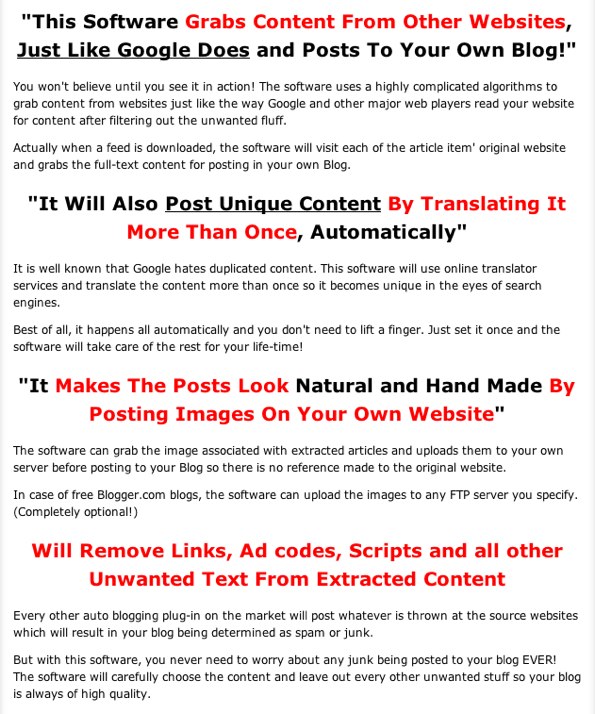What’s coming up for discussion with the new media/old media/social media/internet marketing debate is: how important is ‘original material’?
It’s an issue not just for the Rupert Murdochs of the world: original, quality content for news media — actually any media — is expensive to produce on anything like an ongoing and quality basis. It really is.
Some observers can get all breathless and excited about new media and the ‘instant-ness’ of the internet but much of the runaway success of sites like The Huffington Post and any number of copycats and also-rans is directly attributable to their parasitic behaviour towards the old media they sometimes denigrate. But at least they generally acknowledge sources.
Now, this isn’t intended to be another wee grizzle about aggregators who scrape information from other sources then surround it with their ads … no, that’s cycnical enough, as we have discussed.
But what I’ve seen through this blog and observing others is an emergence of a different aspect of the ‘Content is King‘ idea — and dishonest attempts to build businesses on plagiarism — unsourced copying of original material.
Duplicate content vs ‘original content’
Search engines, we are told, despise duplicate content, although it seems that aversion seems to be overstated by some. (Google: “Duplicate content on a site is not grounds for action on that site unless it appears that the intent of the duplicate content is to be deceptive and manipulate search engine results.”)
In a 21st century version of cupboard love, some so-called ‘internet marketers’ whose stated goal is to ‘steal’ traffic — to (by whatever means possible) get eyeballs on the Google Adsense or Amazon etc ads sprinkled around their Made for Adsense websites — LOVE original content. The trouble is, how can they populate their multiple low-value websites sprinkled through niches like ‘Mickey Mouse earrings’? (This is supposed to be passive income, right? Certainly that’s how their ‘systems’ are being sold to the punters.)
It’s not just a problem for the deceptive get rich quick boys with their slippery prescription:
Send them to a page, where there is an article about making money online, but not any real information, just some general shit. They will be unsatisfied, and they will see those google ads with MAKE 1000000$ [sic] in 3 days. They will click them. Simple as that.

OK, leave aside the obvious contempt for their traffic which, surely, will produce its own result, shysters like this are now discovering the joys of ‘unique content’ — only, they want it on the cheap. Thus, the increasing use of ‘content scraping’ (see below) or supposedly ‘100% unique’ articles ghost-written for your blog(!) What a great way to build trust — by deceit.
… we guarantee that all content is 100% unique. We run all our articles through Copyscape and you may suggest any other tools to use. If you believe content is not unique, simply email us. We offer a full, no questions asked, money back guarantee if content is not unique.
Ironically, this ‘100% unique content’ service is a side business run by the very spruikers selling you the passive cashflow machine um, business. Yes, the same guys.
But this, below, says it as nakedly as anything I’ve seen, including the You Tube Traffic Thieves. It’s plagiarism, pure and simple, even disguising the origins of the authors:
and
“Manage Even Over a 1000 Blogs From A Single Installation”
Every other auto blogging software requires you to install them separately on each of your blog as a plug-in. Imagine if you have 100 blogs! You need to install on all of them and managing each of them every week or so gets even harder.
But with this software, you can manage over a thousand blogs, all from a single installation on your own PC. As simple as that!
“Blogs Created With This Software Appear Natural And Proven To Score High Search Engine Rankings“
It is always hard to rank high in search engines with automated or duplicated content, typically created by other blogging tools. But with this software, every content is translated more than once so it becomes unique and yet have high keyword density for ranking well in search engines.
After-all, it is the Search Engine traffic that is invaluable and that is where you make most of your money from.
“All for the low low price of (today only) … ” Well, you get the picture.
What do you think? Is that a business you can be proud of?
Could you take that to a funder or venture capitalist and look them in the eye?
No.
Anyone running that kind of ‘business’ is, in my personal view, a thief and a fraud. Maybe they already were. If you doubt that judgement, consider the effort they’re putting into ‘fooling’ search engines and covering their copyright larceny to to ‘appear natural’ and conceal the original source of the content.
In a word: deceptive.
I find it interesting that the ‘strategies’ are getting more and more nakedly crooked. It’s also intriguing (to me, anyway) to see content from thePaepae.com popping up on other websites, some sympathetic and some clearly robotic of the style of the ‘we translate it more than once so it appears natural’ liar’s brigade.




[…] In my view, expressed here before, HuffPo cynically exploits other news organizations and writers by scraping their content and relentless (laughable once you twig to it) SEO-pimping. The decline in quality has been noticeable, and fighting that by pinching MORE stuff from others and token linking is weak sauce. See also:Plagiarism as a business model. […]